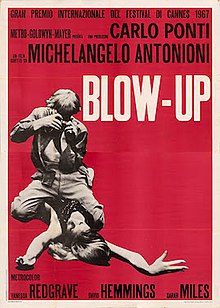
Back انفجار (فيلم) Arabic انفجار ARZ Фотоувеличение Bulgarian Blow Up Catalan Zvětšenina (film) Czech Blowup Welsh Blowup Danish Blow Up German Blow-Up Greek Blow-Up EML
| Blowup | |
|---|---|
 | |
| Directed by | Michelangelo Antonioni |
| Screenplay by |
|
| Dialogue by | Edward Bond |
| Story by | Michelangelo Antonioni |
| Based on | "Las babas del diablo" (1959 short story) by Julio Cortázar |
| Produced by | Carlo Ponti |
| Starring | |
| Cinematography | Carlo Di Palma |
| Edited by | Frank Clarke |
| Music by | Herbie Hancock |
Production companies |
|
| Distributed by | Premier Productions (UK) Metro-Goldwyn-Mayer (worldwide) |
Release dates |
|
Running time | 111 minutes |
| Countries | |
| Language | English |
| Budget | $1.8 million[2] |
| Box office | $20 million[2] |
Blowup (also styled Blow-Up) is a 1966 psychological mystery[3] film directed by Michelangelo Antonioni, co-written by Antonioni, Tonino Guerra and Edward Bond[4] and produced by Carlo Ponti. It is Antonioni's first entirely English-language film and stars David Hemmings, Vanessa Redgrave and Sarah Miles. Model Veruschka von Lehndorff is featured as herself, and Jane Birkin makes her first film appearance. The film's non-diegetic music was scored by American jazz pianist Herbie Hancock, and the English rock group The Yardbirds are seen performing "Stroll On". The cinematographer was Carlo di Palma.
The plot was inspired by Argentine-French writer Julio Cortázar's 1959 short story "Las babas del diablo", which was later retitled "Blow-Up" to tie in with the film.[5] Set within the contemporary mod subculture of Swinging London, the film follows a fashion photographer (Hemmings) who believes he has unwittingly captured a murder on film.[6]
In the main competition of the 1967 Cannes Film Festival, Blowup won the Palme d'Or, the festival's highest honour. The American release of the counterculture-era film[7] with its explicit sexual content defied Hollywood's Production Code, and its subsequent critical and commercial success influenced the abandonment of the code in 1968 in favour of the MPAA film rating system.[8] At the 39th Academy Awards, the film was nominated for Best Director and Best Original Screenplay. The film was also nominated for three BAFTA Awards, including Outstanding British Film.
Blowup has influenced subsequent films including Francis Ford Coppola's The Conversation (1974) and Brian De Palma's Blow Out (1981).[9] In 2012, it was ranked No. 144 in the Sight and Sound critics' poll of the greatest films of all time and No. 59 in the directors' poll.[10]
- ^ a b "Blowup (1967)". British Film Institute. Archived from the original on 11 February 2016. Retrieved 17 July 2018.
- ^ a b Corliss, Richard (5 August 2007). "When Antonioni Blew Up the Movies". Time. Retrieved 21 February 2011.
- ^ "Blow-Up".
- ^ "Best of Bond". The Guardian. 21 January 2008. ISSN 0261-3077. Retrieved 28 October 2018.
- ^ Beltzer, Thomas (15 April 2005). "La Mano Negra: Julio Cortázar and His Influence on Cinema". Senses of Cinema. Archived from the original on 28 October 2010. Retrieved 21 February 2011.
- ^ Cite error: The named reference
nytwas invoked but never defined (see the help page). - ^ Ryce, Walter (27 November 2013). "Ethan Russell's seminal '60s rock photos dazzle at Winfield Gallery in Carmel". montereycountyweekly.com. Retrieved 29 April 2014.
- ^ vbcsc03l@vax.csun.edu (snopes) (25 May 1993). "Re: The MPAA". The Skeptic Tank. Archived from the original on 18 August 2017. Retrieved 1 August 2012.
{{cite web}}: CS1 maint: numeric names: authors list (link) - ^ Ebiri, Bilge (28 July 2017). "The Mysteries of Antonioni's Blow-Up, a Half Century on". Houston Press. Retrieved 25 August 2019.
- ^ "Votes for Blowup (1967)". British Film Institute. Archived from the original on 2 February 2017. Retrieved 22 January 2017.